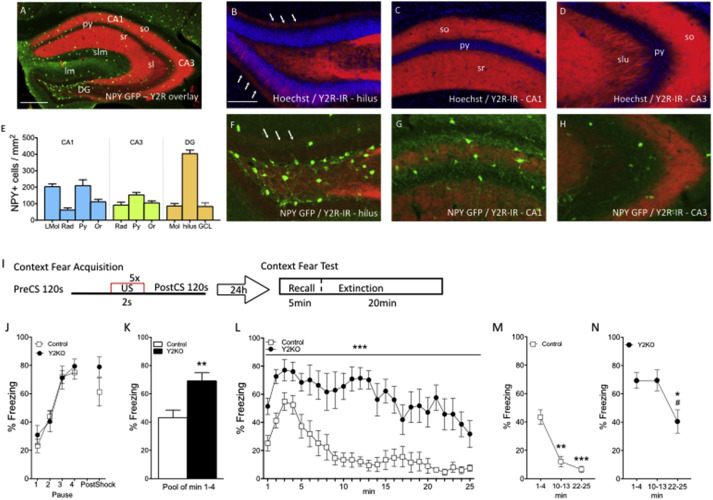Neuropharmacology ( IF 4.6 ) Pub Date : 2018-09-17 , DOI: 10.1016/j.neuropharm.2018.09.018 Birgit A. Hörmer , Dilip Verma , Elisabeth Gasser , Anna Wieselthaler-Hölzl , Herbert Herzog , Ramon O. Tasan

|
Posttraumatic stress disorder is characterized by contextually inappropriate, dys-regulated and generalized fear expression and often resistant to therapy. The hippocampus integrates contextual information into spatial and emotional memories, but how diverse modulatory neurotransmitters are shaping this process is not known. Neuropeptide Y is a peptide-neurotransmitter, which modulates hippocampal excitability by activating several G-protein-coupled receptors. Postsynaptic Y1 receptors create strong anxiolytic and fear-suppressing behavior, while pre-synaptic Y2 receptors (Y2R) are mainly anxiogenic. The role of Y2Rs in spatial compared to emotional learning is, however, still controversial.
Here we show that deletion of Y2Rs increased recall, but delayed extinction of contextual fear. Interestingly, spatial memory in the Barnes maze was enhanced during early and late testing, suggesting that Y2Rs suppress learning by hippocampal and extra-hippocampal mechanisms. To demonstrate sufficiency of hippocampal Y2Rs we performed viral vector-mediated, locally restricted re-expression of Y2Rs in the hippocampus of Y2KO mice. This treatment reduced spatial memory to the level of wildtype mice only during early, but not late recall. Furthermore, contextual fear was reduced, while induction of fear extinction appeared earlier. Our results suggest that hippocampal Y2R signaling inhibits learning in a time- and content-specific way, resulting in an early reduction of spatial memory and in a specific suppression of fear, by reducing fear recall and promoting fear extinction. We thus propose that reduction of hippocampal excitability through pre-synaptic Y2Rs may control the integration of contextual information into developing memories.
中文翻译:

海马NPY Y2受体根据情绪价和时间调节记忆
创伤后应激障碍的特征是情境不适当,调节失调和普遍的恐惧表达,通常对治疗有抵抗力。海马将上下文信息整合到空间和情感记忆中,但是尚不清楚多种调节性神经递质如何塑造这一过程。神经肽Y是一种肽神经递质,它通过激活几个G蛋白偶联受体来调节海马兴奋性。突触后的Y1受体产生强烈的抗焦虑和抑制恐惧行为,而突触前的Y2受体(Y2R)主要是焦虑症。然而,与情感学习相比,Y2R在空间中的作用仍存在争议。
在这里,我们表明删除Y2Rs增加了回忆,但延迟了对背景恐惧的消灭。有趣的是,在早期和晚期测试中,Barnes迷宫中的空间记忆得到了增强,这表明Y2R抑制了海马和海马外机制的学习。为了证明海马Y2R足够,我们在Y2KO小鼠的海马中进行了病毒载体介导的Y2R局部限制性再表达。该处理仅在早期召回期间将空间记忆降低至野生型小鼠的水平,而在晚期召回期间则没有。此外,背景恐惧减少了,而恐惧消亡的诱导则较早出现。我们的结果表明,海马Y2R信号以时间和内容特定的方式抑制学习,从而导致空间记忆的早期减少和对恐惧的特定抑制,通过减少恐惧回忆和促进恐惧消灭。因此,我们建议通过突触前的Y2R减少海马兴奋性可以控制将上下文信息整合到发展中的记忆中。






























 京公网安备 11010802027423号
京公网安备 11010802027423号